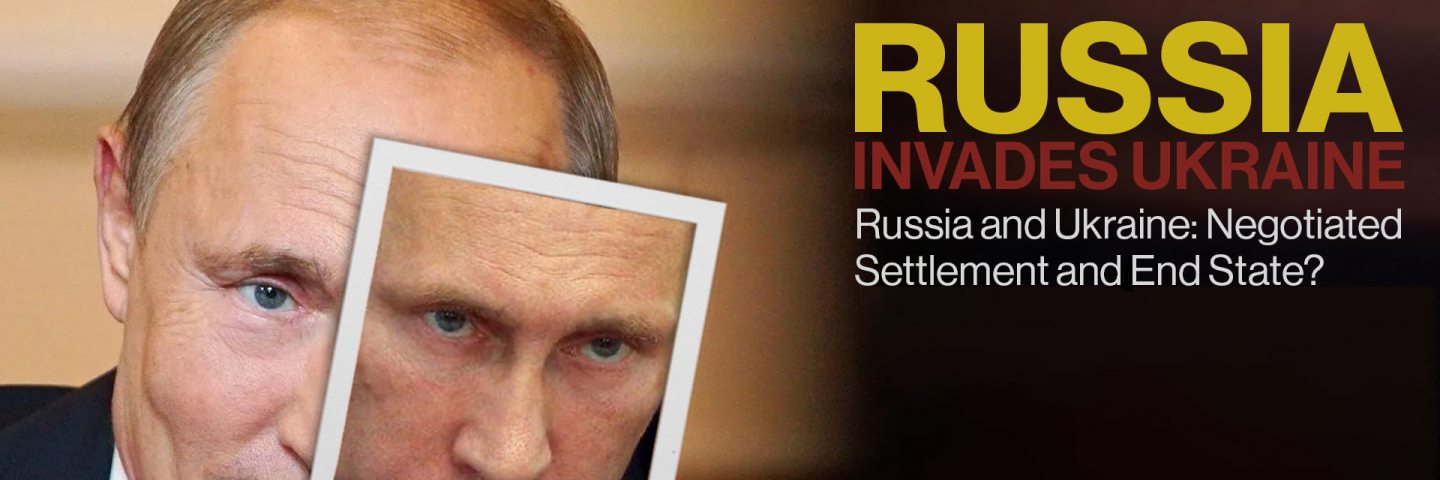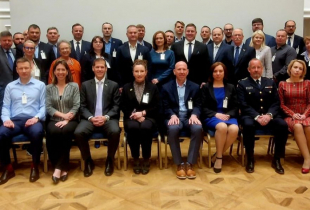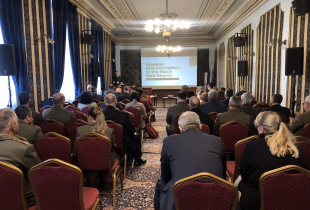
Russia and Ukraine: Negotiated Settlement and End State?
Context
Russia’s invasion of Ukraine appears stalled, giving space for political negotiations. However, there are two wars that need to be addressed: Russia’s aggression against Ukraine and Russia’s war with the West. In the first war, the issues include: 1) “neutrality”; 2) “security guarantees”; 3) de-militarization; 4) “de-nazification”; and 5) the nature of Ukraine’s territorial integrity. Russia’s combat operations have stalled. Forceful breakthrough in several directions are unsuccessful. The siege of Kyiv incomplete, as the visit by three European prime ministers demonstrated. On 21 March President Zelensky stated that Ukraine will not bow to ultimatums from Russia and that Ukrainian cities under attack will not accept occupation. At the same time he urged direct talks with President Putin, saying: “Without this meeting it is impossible to fully understand what they are ready for in order to stop the war.” As a Ukrainian Jew whose relatives died in the Holocaust, his address to the Israeli Knesset compared Russian actions with that of the Nazi’s. Russian propaganda asserting the opposite fails to gain traction outside of Russia.
Russia’s ultimata to the U.S. and NATO in December 2021 in the guise of diplomacy prefigured a recasting of the war in Ukraine as one between the “collective West” (‘Empire of lies’) and Russia (‘Truth and Justice’). In this telling, articulated by Putin at Luzhniki Stadium in Moscow on 18 March 2022, the West carries out “total war” against Russia using a “fifth column” consisting of “national traitors” with “slave consciousness,” as well as information warfare and economic sanctions. According to this understanding, Ukraine is a puppet, under “external control on the part of the West.” For President Putin, Russia is in an existential struggle for its sovereignty, its right to be itself, and so fights a necessary and heroic war of defense. Such military-patriotic mobilization through “total war” propaganda makes up for lost time: Putin had continuously asserted that Russia did not seek war and Russian society was not therefore mobilized to support war prior to the invasion.
Ukraine-Russia Political Settlement
Russia insists that Ukraine adopts a neutral military status, with Russia’s lead negotiator Vladimir Medinsky stating that Russia desires a: “peaceful, free, independent Ukraine that is neutral and not a member of a military bloc, not a member of NATO.” President Zelensky accepts non-NATO membership as a reality: NATO is “not ready to accept Ukraine for at least 15 more years.” The question then is which neutrality model does Ukraine adopt – the Swiss model of armed neutrality and territorial defence – or the non-aligned Finnish and Swedish models, that include EU membership, with its increasingly meaningful Common Foreign and Security Policy. Although the EU as a regulatory and normative geo-economic superpower united in sanctions against Russia poses the greatest danger for rent-based patronal ‘Putinism,’ Putin himself may not understand this reality.
A second focus in the discussions is on security guarantees “for all participants in this process,” Thus a neutral Ukraine would seek guarantees for the “complete security for Ukraine for the time that NATO is not ready to accept us.” Mykhailo Podolyak, Ukraine’s chief negotiator, notes that this: “suggests that there will be no bilateral agreement between Russia and Ukraine, but rather a multilateral agreement, a package agreement that a number of countries will take part in — their number is still being discussed. [But it will be] five to seven countries.” States mentioned as guarantors include nuclear power states – UK, France and US – as well as Turkey, Poland, and Israel. However, how these guarantors punish potential future violators have yet to be defined, and given the failure of the generic Budapest guarantees, identifying specific responses for specific violations may help make the process more credible and reconcile Kyiv to it. Russia itself would need “security guarantees” – but guarantees of what and by whom? This factor does underscore that two peace processes are interlinked.
Russia seeks “demilitarisation” of Ukraine so that “no threats to the Russian Federation ever come from its territory.” The size and capability of Ukraine’s military is a topic for discussion. If Ukraine adopts armed neutrality with security guarantees, this suggests that Ukraine would be armed to the extent that it could defend itself from and so deter future aggressors. This in turn implies a range of air-land-battle capabilities and integrated air-defense systems in place. Limited and symbolic third party border monitoring missions might also ensure demilitarization and act as a security guarantee. All Russian military forces would withdraw from the territory of Ukraine, raising questions regarding Ukraine’s territorial integrity and borders.Ukraine’s post-settlement model may well be Israel. That is, heavily militarized, with a sense of self based on military vulnerability, but with strong external guarantees.
President Putin continues to speak of “denazification” which supports his framing in terms of the Great Patriotic War, while Foreign Minister Lavrov referenced the “termination of nazification policy” in Ukraine. “Denazification” suggests regime change, with ‘regime’ understood in terms of current political and military leadership in Ukraine as well as policies. The “termination of nazification policy” may be understood in terms of a legal regime and refer to “discriminatory legislation” and restrictions on Russian language, education, culture, and mass media in Ukraine. Russia’s narrative around a “special military operation” to “protect the Russian-speaking population” against a Ukrainian Nazi regime encompasses both interpretations.
Territorial issues may be subject to de facto and de jure recognition compromises with regards to Donbas and Crimea but not ‘the South.’ For Donbas, Russia has recognized both Luhansk and Donetsk as independent states according to their de jure 2014 administrative borders. Ukraine will likely insist on the de facto borders of 22 February 2022. Will it settle for the de facto borders by time of settlement? With Crimea, Russia would likely insist on the official recognition of Crimea a permanent part of Russia either immediately or through another referendum, this time with international recognition? President Zelensky has referenced a “Crimea compromise” which suggests that de jure the Autonomous Republic of Crimea (the ARK) is still legally part of Ukraine but de facto Ukraine would work with the current reality. However, in ‘the South’ Russia will seek to maintain the seized North Crimea canal (water security for Crimea) and the land corridor to Donbas, making the Sea of Azov a Russian lake. Russia has begun moves on creating a Kherson Peoples Republic and Mariupol Peoples Republic. For Ukraine trading Mariupol for a wider peace may be a bridge too far.
Culmination Points
- Progress in the war has an effect on the respective strengths and confidence of both sides. We can look to the culmination of Russian military and diplomatic tracks regarding its aggression in Ukraine and the knock-on effects for Russia’s economy and popular and “inner circle” support for Putin. Does Russia meet an impasse or stalemate where continuation forward is no longer possible? Does this then allow for an operational pause and regroup and provide time to mobilize support for a wider war?
- If Russia suffered the isolation and destruction of several battalion tactical groups due to over extended supply lines, encirclement and annihilation, might this tactical defeat resonate on other Russian fronts, leading to collapse, compounded by steady military losses, exhaustion and low morale (as evidenced in the Kostroma 331st Guards Airborne Regiment and 138th motorized rifle brigade)? Alternatively, might Russia escalate to negotiate from a position of greater strength, seeking the formal capitulation of Mariupol or capture of Kharkiv, Sumy, or Mykolaiv as bargaining chips in the negotiations? Might an unexpected Russian break through lead to the belief that “just one more push” leads to victory? This mindset that brought ruin to the Russian army in World War I.
- In Ukraine, 2020-2021 sociological surveys demonstrated public opinion leaning towards integration with the EU and NATO. War has increased Ukrainian support for pro-Western policies and the Ukrainian language, identity, self-belief. On 18 March 2022 Rating sociology group carried out a survey via Computer Assisted Telephone Interviews with 1,000 respondents above the age of 18 in all regions of Ukraine except those currently occupied: 96% believe that Ukraine will repel Russia’s attack. On 21 March President Zelensky stated that the final format for compromises on “security guarantees” and the temporarily occupied territories in the negotiations between Ukraine and Russia may be put to an all-Ukrainian referendum. This mechanism may also facilitate implied changes to Ukraine’s constitution.
- Might vertical escalation through the use of a non-strategic nuclear weapon(s) be used to break the impasse and improve Putin/Russia’s negotiation position? Russia appears unlikely to escalate in this manner for a number of reasons: 1) the impossibility for NATO allies not to have a direct military response and actively consider regime change; 2) the technical difficulties involved in the delivery; 3) a pragmatic Putin fearing his orders might not be carried out chooses not to; 4) the loss of external support – China being critical - as Russia moves from pariah to isolated rogue state status; 5) a staged nuclear test at Novaya Zemlya after withdrawal from the Comprehensive Test Ban Treaty would have the same escalatory signally effect without the risks associated with Ukraine.
- The spring 2021 conscription draft represents a tipping point. As Russia dragoons a new wave of conscripts, draft dodging may prove an indirect indicator of popular support for the war, or lack of it. In addition, once conscripts complete their one year service they are released into society as live witnesses of the realities in Ukraine. Might Russia be tempted to extend conscription and undertake “national mobilization of personnel and industry?” Would this emergency move cause societal backlash and unrest, as well as damage the narrative of a “special military operation” going “according to plan?” Does the deployment of Rosgvardiya for controlling the occupied territories leave too little capacity for managing anti-war movements in Russia itself?
- Deficiencies in Russia’s way of war are evident. The Russian military was unprepared for a multi-axis attack against determined resistance. The centrality of Putin to Putin’s war is highlighted by his portrayal as a popular war leader, though this popularity may be Potemkin-like. Putin is selling “victory” to the Russian public and his “inner circle,” but are they buying? If so, at what price? Putin sought to restore Slavic unity. He breaks it, loses Ukraine and returns Russia to a 1970s “Brezhnev 2.0” construct, with differences: Russia is in open confrontation with the West not competition, is more ideological, weaker and less stable. Coups in Russia - Khrushchev in 1964 or Gorbachev in August 1991 - occur when there is a confluence of opinion in Russian military, KGB and political elites. Has Putin ensured through elite surveillance and a lack of collective institutions that this terminal culmination point is not reached? For now elite opposition manifests itself as passivity and lack of support rather than the active determination to be first mover in the removal of a paranoid and isolated but not yet a fully Potemkin-Putin: “Uneasy lies the head that wears a crown.” (King Richard IV, Part 2, Act 3, Scene 1).
GCMC, March 22, 2022.
About the Authors
Dr. Pavel Baev is a Research Professor at the Peace Research Institute Oslo (PRIO). He is also a Senior Non-Resident Scholar at the Brookings Institution (Washington DC) and a Senior Research Associate with the French International Affairs Institute (IFRI, Paris). Pavel specializes in Russian military reform, Russian conflict management in the Caucasus and Central Asia, energy interests in Russia’s foreign policy, and Russian relations with Europe and NATO.
Dr. Mark Galeotti is director of the London-based consultancy Mayak Intelligence, an honorary professor at the University College London School of Slavonic and East European Studies, a senior associate fellow at the Royal United Services Institute, and a senior non-resident fellow at the Institute of International Relations Prague. He is an expert and prolific author on transnational crime and Russian security affairs.
Dr. Graeme P. Herd is a Professor of Transnational Security Studies and Chair of the Research and Policy Analysis Department at the George C. Marshall European Center for Security Studies (GCMC). Dr. Herd runs a monthly Seminar Series which focuses on Russian crisis behavior, the Russia-China nexus, and its the implications for the United States, Germany, friends and allies. Prior to joining the Marshall Center, he was the Professor of International Relations and founding Director of the School of Government, and Associate Dean, Faculty of Business, University of Plymouth, UK (2013-14). Dr. Herd has published eleven books, written over 70 academic papers and delivered over 100 academic and policy-related presentations in 46 countries.
The George C. Marshall European Center for Security Studies
The George C. Marshall European Center for Security Studies in Garmisch-Partenkirchen, Germany is a German-American partnership and trusted global network promoting common values and advancing collaborative geostrategic solutions. The Marshall Center’s mission to educate, engage, and empower security partners to collectively affect regional, transnational, and global challenges is achieved through programs designed to promote peaceful, whole of government approaches to address today’s most pressing security challenges. Since its creation in 1992, the Marshall Center’s alumni network has grown to include over 15,000 professionals from 157 countries. More information on the Marshall Center can be found online at www.marshallcenter.org.
The articles in this seminar series reflect the views of the authors and are not necessarily the official policy of the United States, Germany, or any other governments.

